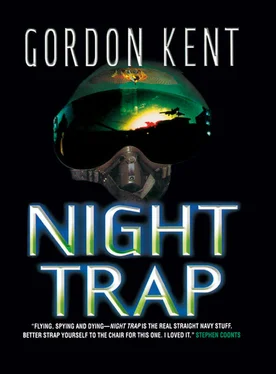“Hey, you see that guy?” The kid nudged him. He was jerking his head toward a young man just coming aboard. Officer, Bonner thought, even in the civilian clothes. Behind him was a huge black man Bonner recognized as a super chief.
“What about him?”
“That’s my skipper’s son. Isn’t that amazing?”
He looked to be a perfectly normal, snot-nosed j.g., from all that Bonner could see. “What’s fucking amazing?”
“He’s the skipper’s son.”
“I’m not amazed.”
“He came in on that S-3 that took the net four nights ago. Maybe you didn’t hear.” He sounded suddenly apologetic, as if he had just realized that what was wonderful to his novice eyes bored the shit out of an old man like Bonner.
Bonner grunted. He didn’t much care about officers. They had almost nothing to do with him. He resented them, but this was simply a fact of life; everybody who wasn’t an officer resented them. But it was a given, part of their world, like the law of gravity. He watched as the super chief seemed to surround the young officer, protecting him. Old Dad had seen to that.
“Nice to have somebody to wipe your ass for you,” he said. The boy snickered. It wasn’t officers Bonner really resented, it was hotshot enlisted like this super chief, clearly younger than Bonner, already making better money. This one, he supposed, got there by being black.
“We’re the biggest minority in the fucking world,” Bonner said.
“Who?”
The boat separated itself from the carrier. The breeze freshened as soon as they swung away. Bonner shivered, then put his face up as they swung into sunlight. “White guys,” he muttered.
Did he really believe that? Bonner was never quite sure what he believed. Other people seemed to have fierce, clear beliefs, but he was aware only of large areas of dislike or grievance or distrust. The White Power guys, for example; they really believed all that, but when he talked to them, they sounded bananas. He knew guys in the Klan; they were out of it, too, he thought. No, what he hated about the Navy, about the world, was something so huge, so unexplainable, that you couldn’t make a cause of it. It was, finally, himself alone, and then this huge Other. That was the enemy. All that .
Not that he didn’t think that black guys got ahead these days because they were black. They did. Also women. But those were just parts of it, just little bits you could see of something huge and hidden.
What he was sure of, what he really knew, was that nobody ever got anything without being crooked somewhere. Find a rich guy, he’d show you a crook. The difference between people with money and people without money was that the ones with hadn’t got caught.
“Hey, man, is this Naples really as bad as they say?” the kid said. He looked nervous. He was like a young chicken, waiting to be plucked. He touched something in Bonner, maybe his attachment to his son.
Bonner began to talk to the kid about Naples. He gave him good advice, even though he knew it was wasted.
“Use a fucking condom. The whores here have AIDS for breakfast.”
Alan Craik let Senior Chief Petty Officer Gibbs shepherd him to the door of the Hilton. Gibbs apparently considered it his duty to keep watch over the skipper’s kid; this could have annoyed the hell out of Alan, but he decided not to let it.
“I think I can get through the front door by myself, Chief.”
Gibbs grinned. He was an enormous man, almost too big for the Navy’s specs. “Naples’s a dangerous place, Mr Craik.”
“Yeah, but the Hilton isn’t. Thanks for babysitting me.”
Gibbs grinned. Alan found the grin patronizing.
“Chief, I used to live in this town. Granted I was only nine. Kids learn a lot. Capisce? ” Gibbs looked skeptical. “My dad was assigned to NATO here. I used to live—right up there.” He pointed up toward the Vomero, hardly visible now between the high-rises. He tried out the Italian he had been practicing in secret, the dimly remembered language of childhood. “ Ero un’ piccolo scugnizz’ americano; ho vista tutto, tutto, d’accordo? ” He made it a joke, laughed, although what he really remembered was that this was where his parents’ marriage had fallen apart. Not because of Naples, but because of the Navy.
“Okay, okay, Lieutenant. Take care, you hear?”
The big man ambled to the curb, then darted into the traffic and was across the street and gone.
Alan went through the doors and into the lobby that seemed familiar because it was international, therefore almost American, in the style of the American century. The woman at the concierge’s desk was stunning, bringing back all of Naples to him in an instant: not a girl, a woman, ample, a Sophia Loren face. Like the maid when he was nine, his friend, who had taught him Italian because she spoke no English. Teresa. Married to a little shrimp of a man who abused her.
“Per favore, signora.”
“Yes, sir?” She wasn’t going to let him speak Italian, he saw.
“A guest named Hoyt? Initial K?” Had Kim been able to get here?
“Twelve-thirty-one, sir. The telephone is right through there.”
His knees felt weak. He hadn’t seen her for six weeks. She had been a new experience for him before he sailed, a poor little rich girl with an appetite. Now, heading for the phones, he was thinking that maybe those nine days were a fiction; maybe he remembered them wrong. And then there was what his father had said about Kim—implying that she was stupid, a bimbo, an easy lay.
But she was here. He had sent a message, and she had jumped on a plane and come.
“Kim? Alan.”
“Oh, God! Come on up! ” She giggled. “I’ve been shopping.”
When she opened her door, he saw what she’d been shopping for. They hardly managed to get the door closed before they were at each other.
PO1 Bonner picked his way around the pimps, dodged the plain-clothes cops, and gestured away the child pickpockets who were waiting for the carrier’s crew. He changed twenty dollars at the booth by the dock, causing a black-market money-changer (probably a cop) to assume a look of deep grievance; then he walked quickly up away from the water and headed into the first tobacco store.
“Camels. And a carty di telyphono. ”
“ Bene .” Bonner dropped fifteen thousand lire and the man counted the correct change. Bonner believed that every Italian would cheat him if given the chance, but he never gave them that chance, and he believed they knew it. It was part of his idea of himself that he had to project an image of toughness and knowingness, or the world would cheat him.
“Gratzy,” he said. The man only nodded.
Every minor crook and sex merchant in southern Italy would be there to greet a major American ship, he believed. The streets of Naples teemed with criminals, anyway, he was sure; today, their numbers would be multiplied—dwarves pretending to be children, mothers who had made cripples of their children to start them on a life of begging, men got up as nuns, transvestites there to lure naive kids into alleys. Bonner was walking through a city of tricksters. It was like this wherever he went; as a result, he never enjoyed himself.
He walked through a narrow street of shops and came out into the great piazza in front of the old Bourbon palace, then along the front of the palace. A few other sailors were already sightseeing there; these were the nerds, the serious ones, what Mattingly called the jerkoffs; one of them even had a guidebook and was reading to his buddy. Bonner walked along behind them. He passed the statues of the Bourbon kings, elevated above him in niches, below each one a stone rectangle and a kind of curb at the bottom. He passed the third of the four kings, and no one watching him could have said for sure whether he looked down and saw the chalked circle on the small curbstone, but when he had walked the length of the palace he turned, without changing his pace, and angled across the piazza, along in front of the curving porticoes that are a little like those of St Peter’s in Rome, and headed into the Via Chiaia. And nobody watching him could have known that seeing the chalked circle had him seething with resentment, for he seemed the same impassive man.
Читать дальше












